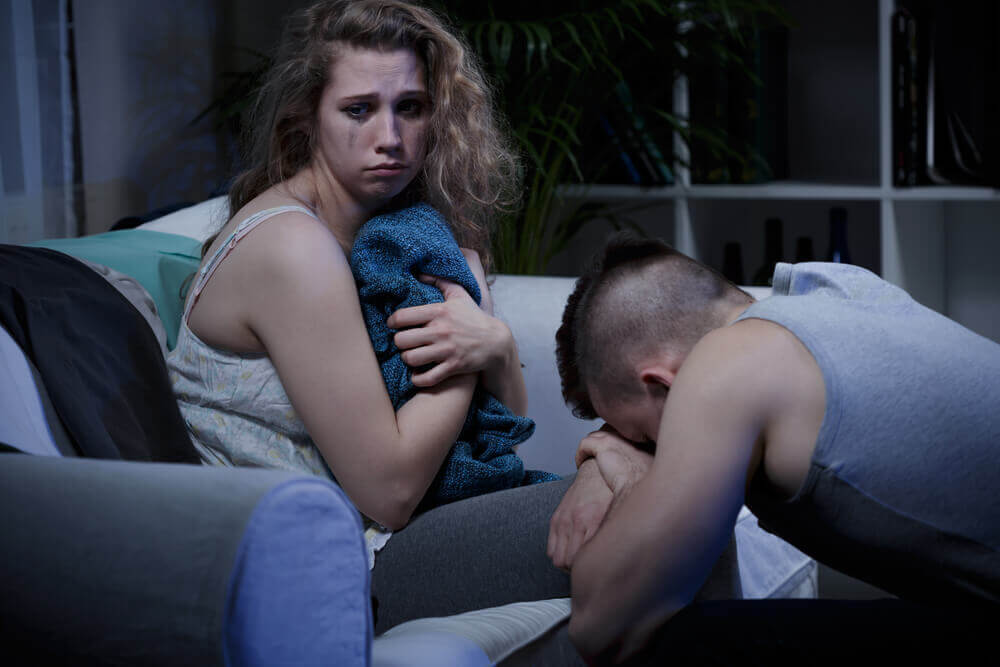The Truth About Toxic Relationships

Spending a lot of time with your partner, always doing what your partner wants, and losing your personal space… These are just some of the characteristics that define toxic relationships.
Other terms that may define this sort of dynamic are negative, controlling, or demanding. However, the effects are the same: Loss of autonomy and emotional dependence on one another.
Toxic relationships don’t follow a linear line where each partner carries the same weight. In fact, quite the opposite is true. In toxic relationships, one of the partners has much more control and power than the other.
Characteristics of toxic relationships
There are a series of factors and particularities that help identify toxic relationships:
Loss of social life
The main characteristic that defines toxic relationships is the loss of one’s social life. This, in turn, involves the loss of personal autonomy. The Merriam-Webster dictionary defines autonomy, and particularly personal autonomy, as “self-directing freedom and especially moral independence.”
Therefore, when we start to depend on someone else, giving up our personal interests to take on another’s, we lose our personality and independence.
This loss has an inevitable effect on our social lives. In this type of relationship, one partner gives up his or her own life and devotes him or herself to the other partner. This means giving up friends, family, hobbies, etc.

It’s true that our autonomy tends to lower a bit at the beginning of a relationship. This has to do with the initial “honeymoon” stage of relationships. However, once this phase is over, both partners should reestablish their autonomy. If that’s not the case, they will head into a stage of isolation.
This is a complicated moment since, in most cases, the person who is suffering doesn’t even realize it. This is true even when family members and friends try to give their opinions.
Emotional dependency
As we said before, relationships need to be symmetrical. In other words, both partners need to have the same amount of worth or carry the same amount of weight.
However, when it comes to toxic relationships, this isn’t the case. In toxic relationships, one partner imposes his or her ideas, actions, and thoughts on the other. No consideration is shown for the wants and needs of the other partner.
When someone starts to give in to these demands, they become emotionally dependent on their partner. They do whatever their partner wants in order to avoid conflicts, problems, or negative aspects that turn into arguments.
In toxic relationships, these kinds of conflicts can turn into abuse – which doesn’t necessarily have to be physical. Abuse may be psychological and manipulative, in order to hurt the weaker partner.
Fear of abandonment
Fear of ending up alone, with no partner, is more common than you might think in toxic relationships. The fear of being alone is a feeling that can lead to the emotional dependency and loss of autonomy we mentioned earlier.
This happens when someone surrenders their entire life to their partner… The thought of the relationship ending produces a profound sense of emptiness and loneliness. When this happens, it’s extremely important for friends and family to communicate their opinions about the relationship. Then, hopefully, their loved one can open his or her eyes.
What to do about toxic relationships?
Communication and understanding are the two most fundamental keys to making a relationship work. It’s important for both partners to listen to one another, even when they don’t agree. Being able to express one’s thoughts and feelings, and being met with understanding, are fundamental in a healthy relationship.

If these aspects aren’t in place, more and more respect is loss and the relationship goes in a downward spiral. This is when we need to evaluate whether or not the relationship is really worth it for both partners.
On many occasions, people who find themselves in this kind of relationship should reach out for professional help. In some cases, couples therapy may help, but often individual therapy is the best option. People who get into toxic relations have a hard time getting out of them and are prone to repeating the same mistake.
Spending a lot of time with your partner, always doing what your partner wants, and losing your personal space… These are just some of the characteristics that define toxic relationships.
Other terms that may define this sort of dynamic are negative, controlling, or demanding. However, the effects are the same: Loss of autonomy and emotional dependence on one another.
Toxic relationships don’t follow a linear line where each partner carries the same weight. In fact, quite the opposite is true. In toxic relationships, one of the partners has much more control and power than the other.
Characteristics of toxic relationships
There are a series of factors and particularities that help identify toxic relationships:
Loss of social life
The main characteristic that defines toxic relationships is the loss of one’s social life. This, in turn, involves the loss of personal autonomy. The Merriam-Webster dictionary defines autonomy, and particularly personal autonomy, as “self-directing freedom and especially moral independence.”
Therefore, when we start to depend on someone else, giving up our personal interests to take on another’s, we lose our personality and independence.
This loss has an inevitable effect on our social lives. In this type of relationship, one partner gives up his or her own life and devotes him or herself to the other partner. This means giving up friends, family, hobbies, etc.

It’s true that our autonomy tends to lower a bit at the beginning of a relationship. This has to do with the initial “honeymoon” stage of relationships. However, once this phase is over, both partners should reestablish their autonomy. If that’s not the case, they will head into a stage of isolation.
This is a complicated moment since, in most cases, the person who is suffering doesn’t even realize it. This is true even when family members and friends try to give their opinions.
Emotional dependency
As we said before, relationships need to be symmetrical. In other words, both partners need to have the same amount of worth or carry the same amount of weight.
However, when it comes to toxic relationships, this isn’t the case. In toxic relationships, one partner imposes his or her ideas, actions, and thoughts on the other. No consideration is shown for the wants and needs of the other partner.
When someone starts to give in to these demands, they become emotionally dependent on their partner. They do whatever their partner wants in order to avoid conflicts, problems, or negative aspects that turn into arguments.
In toxic relationships, these kinds of conflicts can turn into abuse – which doesn’t necessarily have to be physical. Abuse may be psychological and manipulative, in order to hurt the weaker partner.
Fear of abandonment
Fear of ending up alone, with no partner, is more common than you might think in toxic relationships. The fear of being alone is a feeling that can lead to the emotional dependency and loss of autonomy we mentioned earlier.
This happens when someone surrenders their entire life to their partner… The thought of the relationship ending produces a profound sense of emptiness and loneliness. When this happens, it’s extremely important for friends and family to communicate their opinions about the relationship. Then, hopefully, their loved one can open his or her eyes.
What to do about toxic relationships?
Communication and understanding are the two most fundamental keys to making a relationship work. It’s important for both partners to listen to one another, even when they don’t agree. Being able to express one’s thoughts and feelings, and being met with understanding, are fundamental in a healthy relationship.

If these aspects aren’t in place, more and more respect is loss and the relationship goes in a downward spiral. This is when we need to evaluate whether or not the relationship is really worth it for both partners.
On many occasions, people who find themselves in this kind of relationship should reach out for professional help. In some cases, couples therapy may help, but often individual therapy is the best option. People who get into toxic relations have a hard time getting out of them and are prone to repeating the same mistake.
All cited sources were thoroughly reviewed by our team to ensure their quality, reliability, currency, and validity. The bibliography of this article was considered reliable and of academic or scientific accuracy.
- Andrade, S., Castro, P., Giraldo, L., & Martínez, M. (2013). Relaciones Tóxicas de pareja. Psicologia.Com.
- Real Academia Española. (2017). Diccionario de la lengua española. Edición del tricentenario. https://dle.rae.es/?id=4TsdiBo
This text is provided for informational purposes only and does not replace consultation with a professional. If in doubt, consult your specialist.








